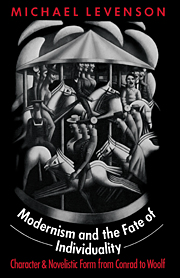Book contents
- Frontmatter
- Contents
- Preface
- Acknowledgements
- 1 Two cultures and an individual: Heart of Darkness and The Ambassadors
- 2 Liberalism and symbolism in Howards End
- 3 Justification, passion, freedom: character in The Good Soldier
- 4 Form's body: Lewis's Tarr
- 5 “The passion of opposition” in Women in Love: none, one, two, few, many
- 6 From the epic To the Lighthouse
- Notes
- Index
2 - Liberalism and symbolism in Howards End
Published online by Cambridge University Press: 16 September 2009
- Frontmatter
- Contents
- Preface
- Acknowledgements
- 1 Two cultures and an individual: Heart of Darkness and The Ambassadors
- 2 Liberalism and symbolism in Howards End
- 3 Justification, passion, freedom: character in The Good Soldier
- 4 Form's body: Lewis's Tarr
- 5 “The passion of opposition” in Women in Love: none, one, two, few, many
- 6 From the epic To the Lighthouse
- Notes
- Index
Summary
Liberalism and symbolism, both unwieldy terms, become more unwieldy when brought together. They seem to belong to such different orders of description and such different strains of modernity that it provokes a small mental shudder to recall that John Stuart Mill and Charles Baudelaire were near contemporaries. Although no one would mistake E. M. Forster for either Mill or Baudelaire, liberalism and symbolism are prominent in his ancestry, and Howards End (1910), which occupies a place in both lineages, marks a striking point of connection between political hopes and literary tropes. The only thing more vivid than Forster's perception of social constraint was his perception of imaginative escape. Looking at the world from the standpoint of historical necessity and the standpoint of visionary possibility, he saw depth in modern experience but also incongruity, because he saw with one liberal and one symbolist eye. It is necessary to correct for the parallax. In following the competition but also the cooperation of these perspectives, this chapter gives the issues raised in the first chapter a turn towards politics and a turn towards mysticism. It asks what happens to the experience of the self when its own modes of understanding come into conflict and when it is unsure whether it has sustained a symbolic victory or a political defeat.
- Type
- Chapter
- Information
- Modernism and the Fate of IndividualityCharacter and Novelistic Form from Conrad to Woolf, pp. 78 - 101Publisher: Cambridge University PressPrint publication year: 1991



